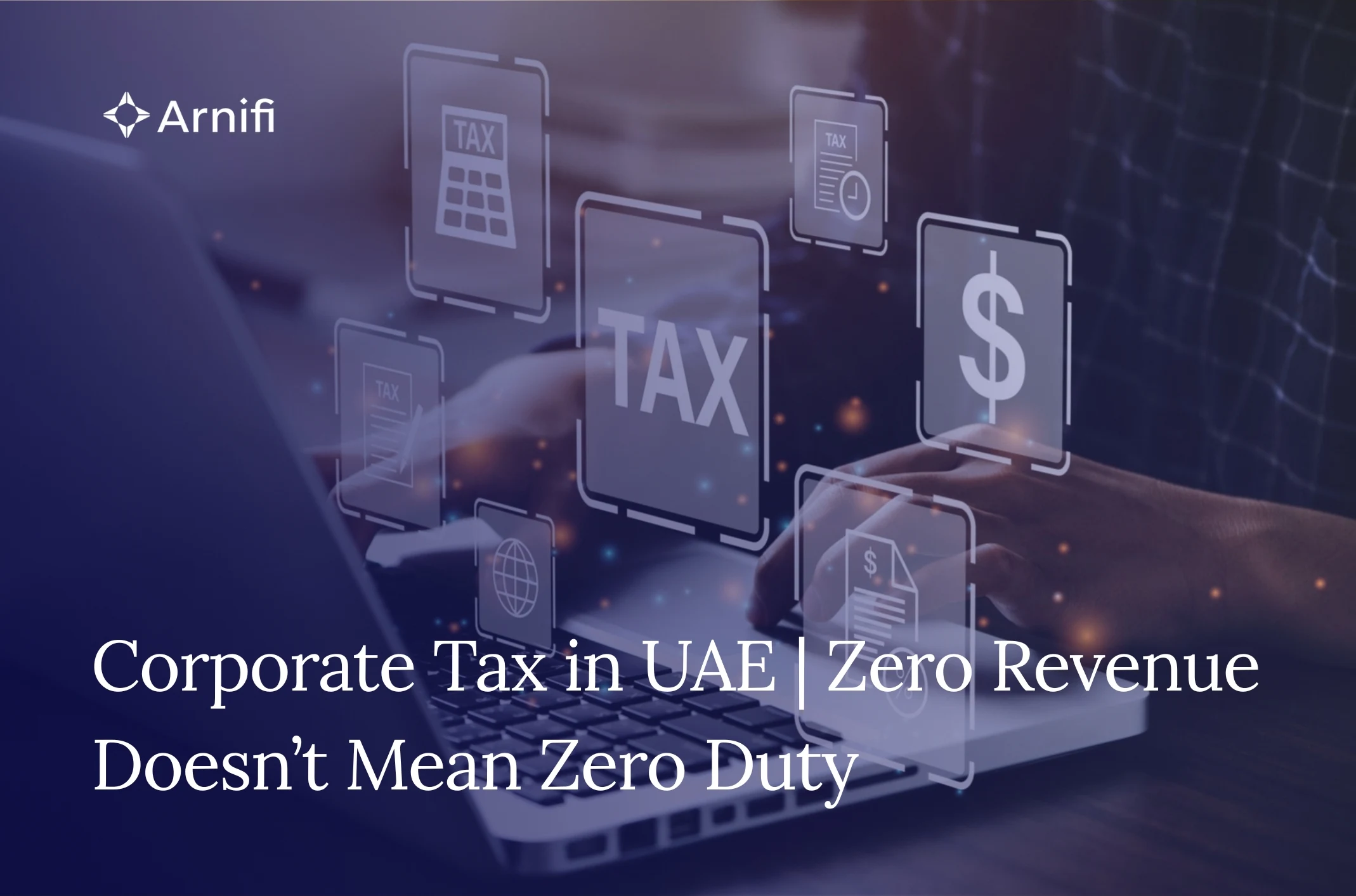An Overview of Corporate Tax Law in the UAE
by
Shethana
Oct 28, 2024  5 MIN READ
5 MIN READ
The UAE’s corporate tax law landscape is evolving, and understanding its structure is essential for businesses looking to establish or expand within the country.

With the introduction of new corporate tax rates and compliance standards, companies need to stay informed on legal obligations and potential benefits. This blog offers an overview of UAE corporate tax laws, highlighting key elements such as tax rates, exemptions, compliance requirements, and reporting standards. We’ll also explain how Arnifi can assist businesses in navigating UAE corporate tax laws, ensuring compliance and efficiency in all tax-related processes.
The Significance of Corporate Tax in the UAE
As the UAE continues to present itself as an increasingly attractive business destination, their understanding of corporate tax requirements is more paramount than ever. Corporate tax laws in the UAE are oriented towards enhancing economic development and attracting international investors, while the new regulations hold assurance of greater transparency and compliance. So, in this blog, businesses will get a comprehensive overview of UAE corporate tax laws to understand their obligations and benefits within the UAE market.
Corporate Tax Rates and Applicability
Recently, the UAE brought the corporate tax rates in place, integrating elements of competitive yet fair tax aspects:
Standard Corporate tax rate: A tax rate of 9% will be used for taxable income above AED 375,000 in a harmonious balance between revenues to the government and affordability to business.
Tax-free threshold: All businesses with an annual profit of less than AED 375,000 will not be required to pay corporate tax; thus, this benefits small businesses and start-ups.
Free Zone Exemptions: Companies in qualifying UAE Free Zones may remain exempt from corporate tax on income generated within the Free Zone or internationally, subject to compliance with UAE tax regulations.
These rates make the UAE competitive, especially for international businesses looking to establish regional headquarters or trade hubs.
Exemptions and Special Categories
Given below are the businesses exempted from corporate tax in the UAE:
Government-Owned Entities: Businesses owned or operated by the UAE government do not pay corporate tax.
Resource Sector: Concerned companies engaged in the extraction of natural resources are subjected to emirate-level taxation and are exempted from federal corporate tax.
Non-Profit Organizations: Depending on the nature and classification of the government approval, non-profit and charitable organizations with regard to their subject may be exempted from this duty, however only if they have achieved all qualifications required to be allowed.
Knowledge of the exemption will be important for businesses looking to take advantage of tax relief that is available for their industry or sector.
Also Read: Understanding Corporate Taxation in the USA
Compliance and Reporting Requirements
The set rules by corporate taxes require companies in the UAE to operate within a well-defined compliance and reporting framework :
Annual Filing Requirements: All corporations are expected to file an annual corporate tax return that outlines the income, expenses, and the deductions that will be used to report their taxable income.
Record Keeping Standards: An organization must ensure that it maintains complete records for at least seven years to ensure transparency and accuracy in reporting.
Transfer Pricing Rules: The general UAE corporate tax guidelines have transfer pricing principles, where all related-party transactions are carried out according to the fair market standard. Businesses must record all transactions involving a related party.
Compliance to these standards can cause a penalty so careful record-keeping and timely filing is essential for businesses.
Implications for Foreign and Multinational Companies
The UAE’s corporate tax structure is designed to appeal to foreign businesses, though specific regulations apply:
Permanent Establishment (PE): Foreign companies with a physical presence in the UAE are subject to corporate tax law, requiring them to file UAE tax returns based on profits generated within the country.
Double Taxation Avoidance Agreements (DTAA): The corporate tax law system in the UAE has established numerous DTAAs with other countries to prevent businesses from paying taxes twice on the same income, promoting international trade and investment.
Withholding Tax Exemption: The UAE does not impose withholding taxes on dividends, royalties, or interest payments, which is advantageous for foreign businesses managing international transactions.
For multinational companies, these regulations mean that the UAE can serve as an ideal location for regional operations due to reduced tax burdens and favorable international agreements.
How Arnifi Can Help with UAE Corporate Tax Compliance
Corporate tax compliance in the UAE requires a nuanced understanding of local and federal regulations. Arnifi supports businesses by offering end-to-end tax compliance solutions, ensuring a seamless approach to UAE tax obligations:
Customized Compliance Strategy
Arnifi tailors compliance strategies based on your company’s structure, industry, and income, ensuring that your tax approach aligns with UAE regulations and takes full advantage of eligible exemptions.
Efficient Filing and Reporting Services
With Arnifi’s expertise, businesses can complete annual filings accurately and on time, reducing the risk of penalties and optimizing the filing process.
Long-Term Advisory Services
Beyond filing and compliance, Arnifi provides strategic tax advisory services to help businesses maintain a competitive edge within the UAE’s regulatory framework, ensuring sustained tax efficiency and compliance.
Partner with Arnifi to navigate corporate tax laws confidently, so your business can focus on growth while maintaining seamless tax compliance.
For more resources on navigating UAE corporate tax laws, visit our Business Setup & Incorporation page.
Top UAE Packages

Related Articles
Top UAE Packages



